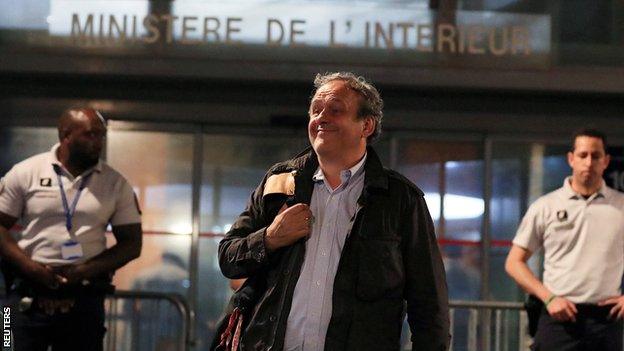Michel Platini released after being questioned over awarding of World Cup to Qatar
- Published

Michel Platini leaves a police station in Nanterre where he was questioned
Former Uefa president Michel Platini has been released by French anti-corruption investigators after being questioned over the awarding of the 2022 World Cup to Qatar.
Platini, 63, was head of European football's governing body until being banned in 2015 for ethics breaches.
The former France midfielder and three-time Ballon d'Or winner has always denied any wrongdoing.
Qatar beat bids from USA, Australia, South Korea and Japan in 2010.
Platini was taken into custody and questioned in Nanterre, a suburb in western Paris, on Tuesday.
He was released from custody later that night.
"It was long but considering the number of questions, it could only be long, since I was asked about Euro 2016, the World Cup in Russia, the World Cup in Qatar, Fifa," said Platini.
Officials have been investigating alleged corruption connected to the 2018 and 2022 World Cups for the past two years and were reported to have interviewed Sepp Blatter, the former president of world governing body Fifa, in 2017.
In a statement, Platini's lawyers reiterated he had not been arrested and had "expressed himself serenely and precisely, answering all the questions, including those on the conditions for the awarding of Euro 2016, and has provided useful explanations".
They added: "He has nothing to do with this event which doesn't concern him at all. He is absolutely confident about what's next."
Fifa said it was aware of Platini's questioning, but added it was "not in a position to comment further".
Platini was banned over a 2m Swiss francs (£1.3m) "disloyal payment" from Blatter, who was also banned from football for his part in the matter. Blatter has also always denied any wrongdoing.
Platini's eight-year ban was later reduced to four on appeal and will expire in October 2019.
Qatar's bid team has been previously accused of corruption, but was cleared following a two-year Fifa inquiry.
However, former Football Association chairman Greg Dyke told BBC Radio 4's PM programme that the decision to award Qatar the 2022 World Cup was a "bizarre" one.
"I think anyone who was involved in that decision has to be questioned because it was such a bizarre decision," he said.
"It was against the advice of their own technical committee, who said they didn't think it would be safe - and as we now know they have had to move it to the winter to make it safe. And Qatar didn't meet all sorts of criteria, so it was always a very odd decision.
"I like Michel Platini. I thought he was a good leader for Uefa and he was a very likeable, charismatic man.
"In some ways it's sad that this is being dragged up again but if you look at the wider picture of why was that World Cup awarded to Qatar, there are still so many questions to be answered."
Analysis
BBC sports editor Dan Roan
This is the result of two years of work by French investigators from the country's serious financial crime unit, who - just like their counterparts in the US and Switzerland - have been looking into allegations of corruption connected to Fifa's shock decision to award Qatar the World Cup in 2022.
Given that Blatter has been interviewed as part of the same case, it is no surprise that Platini is also now facing questions.
It is understood these will focus on a lunch Platini attended in Paris just days before that hugely controversial vote in 2010, with the then French president Nicolas Sarkozy at his official residence and the Qatari head of state.
It has long been suspected that the prospect of important bilateral trade deals between the two nations, and the subsequent Qatari takeover of Paris St-Germain may have been used as leverage to get Sarkozy's support.
Platini has always denied that was why he changed his mind to vote for Qatar (rather than the US).
Given how much time has now passed since the 2010 vote, and how much has changed at Fifa, there seems no real prospect that this latest development could affect Qatar's status as hosts, even if Platini is charged.
Fifa's own 2014 internal investigation effectively cleared Qatar of corruption, and stripping it of the event at this stage could leave it open to legal action.
But yet again it does serve as a reminder of the scandal and suspicion that surrounds the saga of how Qatar won the right to stage the event.
Back in 2015, when still one of the sport's most powerful figures, Platini told me he had "no regrets" about voting for Qatar, despite the allegations of corruption and human rights abuses directed against the country, and the havoc a winter tournament would play with the European game he represented at the time.
He may feel differently now.